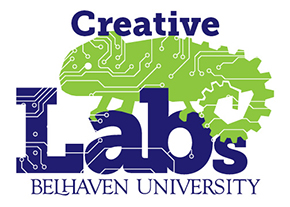 July 29, 2021 (Jackson, Miss.) - Belhaven University is joining the maker movement through a major collaboration between its Art and Design Department and Mathematics and Computer Science Departments.
July 29, 2021 (Jackson, Miss.) - Belhaven University is joining the maker movement through a major collaboration between its Art and Design Department and Mathematics and Computer Science Departments.
This partnership, known as Belhaven Creative Labs, will bring together students of all disciplines to work on physical projects that foster technical education and creative exploration.
The new program encourages Belhaven students to seek out connections between disciplines, and ultimately, foster an autonomous maker culture at the University.
Students will have opportunities to learn and work on projects of their own interests, as related to STEAM (science, technology, engineering, arts, and mathematics).
Projects will involve 3D printing, design software, coding, circuitry and micro-processors, sculpting, data science, wood crafting, robotics, virtual reality, and more.
University professors introduced Belhaven Creative Labs to prepare students for careers, develop creativity and critical thinking, and provide an outlet to engage society in meaningful ways.
“The future of science is not full of Newton-under-the-apple-tree moments, but rather teams of varying specialties,” said, Dr. John Estes, Belhaven's Chair of Mathematics and Computer Science, Professor of Mathematics, and Director of Engineering Partnerships.
“Maker culture helps young computer science students learn to work with chemistry students, and for engineering students to see the design process carried out so well by art students. In an increasingly connected world, maker culture assists students to understand and thrive in connections of other disciplines,” said Estes.
Belhaven Creative Labs are unique because its footprint spans several lab spaces around the campus. Fitzhugh Hall will include labs for design, circuitry, and bots. The Warren Hood Library will be home to the coding lab that covers simple circuits and machine learning to data science. Bitsy Irby will host the 3D digital fabrication lab and sculpture studio.
Belhaven's maker program has the versatility to be strong in the arts and the sciences, something that is uncommon in the maker community. Most universities are missing an art component to their programs, but Belhaven leaders understood the importance of including art.
Nate Theisen, Belhaven's Co-Chair and Professor of the Art and Design Department, observed, “We are invested in the idea that design and aesthetics play a fundamental role in physical production. Learning starts with curiosity, and solutions originate from critical thinking and creativity. Maker culture provides an environment that fosters these important ingredients to learning.”
Theisen also believes that cultivating a maker culture could have long-lasting effects that impact the world. He states, “The mission of higher education is to create responsible leaders that change the world through the application of knowledge and technical abilities. Similarly, through physical production, maker culture provides a response to human needs by generating communities that develop solutions to local and global problems. Put another way, both higher education and maker cultures produce culture-makers.”
